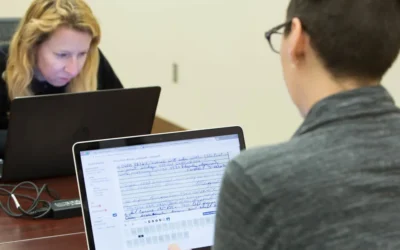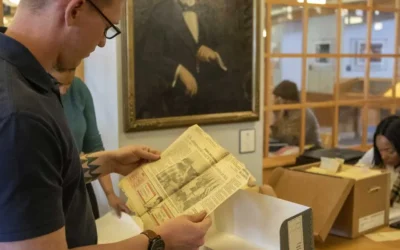The Socially Intelligent Archivist
Margot Note
The realm of archivists extends beyond the custodianship of historical documents.
They assume the mantle of entrusted project managers, safeguarding cultural heritage and facilitating access to invaluable information. The importance of soft skills in archival management’s intricacies is a guiding beacon. Archivists can cultivate socially intelligent practices, ensuring a triumphant voyage in managing archival projects.
At the heart of socially astute archivists lies emotional intelligence, encompassing the understanding and regulation of emotions while also empathizing with the feelings of others. Developing emotional intelligence empowers archivists to forge meaningful connections with team members, stakeholders, and researchers. By discerning their needs, concerns, and motivations, they establish a positive and collaborative workspace that amplifies productivity and teamwork.
Communication is the cornerstone of any project, and many archivists excel in this soft skill. Transparent and candid communication with team members and stakeholders ensures a shared understanding of project goals, timelines, and progress. Regular updates to all involved parties, attentive listening to their feedback, and swift addressing of concerns are vital. Effective communication curtails misunderstandings, nurtures trust, and cultivates shared accountability for the project’s triumph.
Conflict and Collaboration
Conflicts may arise during an archival project, and their management can significantly influence outcomes. Socially adept archivists perceive conflicts as opportunities for growth and learning. Rather than avoiding conflicts, they confront them directly and seek resolutions through dialogue and negotiation. Addressing conflicts with empathy and insight transforms intricate situations into prospects for enhanced collaboration.
Archival projects rarely unfold in isolation; they hinge upon the cooperation of diverse stakeholders, including researchers, benefactors, and community members. Socially adept archivists excel in fostering collaboration and teamwork. Cultivating a culture of communication, inclusiveness, and mutual respect among team members is paramount. Creating an environment where ideas flow, and collective input is valued fosters a united team that overcomes challenges and strives towards shared objectives.
Socially adept archivists prioritize tasks, set realistic deadlines, and optimize resource allocation. Proactively managing time helps them thwart delays and avoid hasty decisions. Effective time management propels projects forward seamlessly, keeping them on track to deliver outcomes punctually and within budget.
Adaptability and Achievements
Archival endeavors often encounter unexpected twists and turns. Socially adept archivists possess adaptability and embrace flexibility. Being prepared to recalibrate plans, timelines, and strategies when circumstances demand, archivists maintain an open mindset and demonstrate agility in response to changing scenarios. This flexibility ensures that archival projects stay on course and deliver the desired results.
Celebrating the team’s accomplishments is essential as milestones are achieved and projects successfully concluded. Recognizing the dedication and efforts of team members and expressing gratitude to stakeholders and supporters is paramount. Equally important is gleaning insights from challenges and setbacks. Reflecting on areas for improvement and documenting lessons learned to inform future projects is integral.
Embracing Social Acumen
Emotional intelligence is indispensable for archivists striving for success in an ever-evolving information landscape. The archival domain is undergoing rapid transformations due to technological advancements and changing paradigms in information management. Archivists equipped with emotional intelligence can navigate these shifts and lead their teams through periods of change. They are adept at empathetically understanding their colleagues’ concerns, fostering communication and collaborative problem-solving. In uncertainty, emotional intelligence allows archivists to exhibit resilience, remaining composed and adaptable while embracing novel strategies and methodologies. Archivists nurture a milieu of methods by engaging in the constructive resolution of conflicts, showing a propensity for adaptability, and demonstrating proficiency in time management. These methodologies, in turn, fortify the realization of their archival undertakings. By recognizing and managing their emotions and understanding those around them, archivists can champion a culture of flexibility and innovation that ensures the preservation and dissemination of cultural heritage, even amid transformative change.
Archivists encompass an ambit that entails the cultivation of affiliations with colleagues and stakeholders. The embrace of socially astute paradigms not only endows them with the capacity to navigate adversities but also empowers them to forge coalitions. Through the adept application of these paradigms, archivists achieve project triumph while preserving cultural patrimony. Socially intelligent archivists lay a foundation for a trajectory in archival project management.
Never miss another post. Subscribe today!
Similar Posts
Collaborative Archival Relationships
Collaborative projects are instrumental in showcasing how archival collections can benefit various organizational departments.
Informational, Evidential, and Intrinsic Values within Archives
Archives provide authentic, reliable information and hold values that reflect their functions and uses; informational, evidential, and intrinsic.
A Sustainable Archives
Archivists prioritize sustainable practices and policies, rooting their work in ethics of care, often preferring digital processing and preservation
Archival Branding and PR Strategies
Archivists who adopt branding and PR strategies both safeguard historical treasures and contribute to their organizations’ evolution.




Leave a Comment
Comments are reviewed and must adhere to our comments policy.
0 Comments